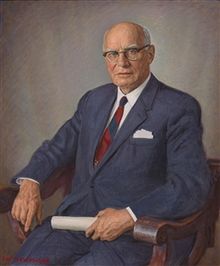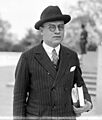Emanuel Celler facts for kids
Quick facts for kids
Emanuel Celler
|
|
|---|---|

Portrait by Joseph Margulies, 1963
|
|
| 39th Dean of the United States House of Representatives | |
| In office January 3, 1965 – January 3, 1973 |
|
| Preceded by | Carl Vinson |
| Succeeded by | Wright Patman |
| Chair of the House Judiciary Committee | |
| In office January 3, 1955 – January 3, 1973 |
|
| Preceded by | Chauncey W. Reed |
| Succeeded by | Peter W. Rodino |
| In office January 3, 1949 – January 3, 1953 |
|
| Preceded by | Earl C. Michener |
| Succeeded by | Chauncey W. Reed |
| Member of the U.S. House of Representatives from New York |
|
| In office March 4, 1923 – January 3, 1973 |
|
| Preceded by | Lester D. Volk |
| Succeeded by | Elizabeth Holtzman |
| Constituency | 10th district (1923–45) 15th district (1945–53) 11th district (1953–63) 10th district (1963–73) |
| Personal details | |
| Born | May 6, 1888 New York City, U.S. |
| Died | January 15, 1981 (aged 92) New York City, U.S. |
| Political party | Democratic |
| Alma mater | Columbia University (BA, LLB) |
| Occupation | Lawyer |
Emanuel Celler (born May 6, 1888 – died January 15, 1981) was an American politician from New York City. He served in the United States House of Representatives for nearly 50 years. This long service lasted from March 1923 to January 1973.
Celler was a member of the Democratic Party. He strongly supported helping Jewish refugees who were escaping Europe during World War II. He also led the House Judiciary Committee for many years. In this role, he helped pass important civil rights laws. His political district was mainly in Brooklyn and Queens, New York.
In the early 1970s, Celler did not support the Equal Rights Amendment for women. He lost his re-election bid in 1972 to Elizabeth Holtzman. This made him the most senior Representative ever to lose a primary election. He holds the record for being the longest-serving member of Congress from New York.
Contents
Early Life and Career
Emanuel Celler was born in Brooklyn, New York. His parents were Josephine and Henry H. Celler. All his grandparents came from Germany. He went to Boys High School in Brooklyn. Later, he studied at Columbia University and Columbia Law School. He became a lawyer in New York in 1912.
Before entering politics, Celler worked as a lawyer. In 1922, he became the first Democrat to be elected from his district. He is the fifth longest-serving congressman in U.S. history. Only four other people served longer than him. He is also the longest-serving member of Congress from New York.
Serving in Congress
Celler represented parts of Brooklyn and Queens in Congress. His district numbers changed over the years due to redrawing of district maps. He served in the United States Congress for five decades.
Fighting for Immigration Rights
Celler gave his first important speech in Congress about the Johnson–Reed Immigration Act of 1924. This law set strict limits on immigration. It favored immigrants from certain parts of Europe. Celler strongly opposed this law. He believed it was unfair to many people, including Jews and Catholics.
For the next 40 years, Celler worked hard to change these immigration rules. He wanted to remove the limits based on where people came from.
During the 1940s, Celler spoke out against isolationism. This was the idea that the U.S. should stay out of world affairs. He pushed for the U.S. to allow more immigrants. He wanted to rescue people fleeing the the Holocaust. In 1943, he criticized President Franklin D. Roosevelt's immigration policy. He called it "cold and cruel."
In 1965, Celler helped pass the Hart-Celler Act. This law finally ended the old system of national origin quotas. It was a major victory for Celler after 41 years of fighting for fair immigration.
Protecting Competition in Business
In 1950, Celler helped create the Celler-Kefauver Act. This law strengthened the Clayton Antitrust Act. It made it harder for large companies to merge. The goal was to prevent big businesses from becoming too powerful. It also stopped them from limiting competition.
In 1951, Celler held hearings about Major League Baseball (MLB). He looked into why MLB was exempt from anti-trust laws. These laws usually stop businesses from acting like a monopoly. Celler's report suggested that Congress should not act. He thought the courts should decide the issue. In 1953, the Supreme Court of the United States upheld MLB's exemption.
Standing Up to McCarthyism
In the early 1950s, Senator Joseph McCarthy accused many people of being disloyal. This period is known as McCarthyism. McCarthy attacked Celler's patriotism. At the 1952 Democratic Convention, Celler spoke out against McCarthy. He said McCarthy was trying to make people lose faith in their government. Celler believed McCarthy was spreading fear and suspicion.
Leading on Civil Rights
Celler was the Chairman of the House Judiciary Committee for many years. He held this position from 1949 to 1973, except for a short break. In this role, he was key in writing and passing major civil rights laws. These included the Civil Rights Act of 1964 and the Voting Rights Act of 1965. He worked closely with Representative William Moore McCulloch to get support from both parties. This helped overcome opposition from Southern Democrats.
In 1965, Celler also proposed the Twenty-fifth Amendment. This amendment made it clearer what happens if a president cannot do their job. It clarified who takes over the presidency.
Final Years in Congress
In June 1972, Celler unexpectedly lost the Democratic primary election. He was the most senior member of the House at the time. He lost to Elizabeth Holtzman, a more liberal Democrat. One reason for his loss was his opposition to the Equal Rights Amendment for women. Celler was the most senior congressman ever to lose a primary election.
Even though he was still on the ballot for another party, Celler supported Holtzman. She went on to win the general election.
Later Life
After leaving Congress, Celler remained active. He often spoke about immigration and other topics he worked on. During the Watergate scandal in the 1970s, he was a frequent guest on TV and radio. He discussed the Watergate hearings and the role of the Judiciary Committee. If he had not lost his election, Celler would have led these important hearings.
Emanuel Celler passed away in his hometown of Brooklyn at the age of 92.
Images for kids
See also
- List of Jewish members of the United States Congress
 | Jewel Prestage |
 | Ella Baker |
 | Fannie Lou Hamer |





